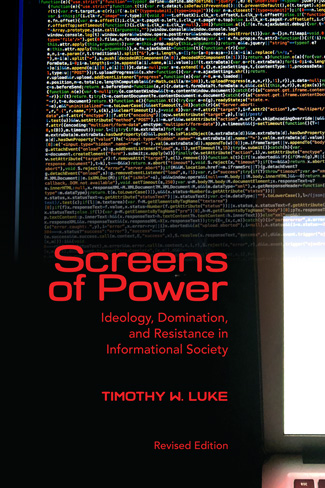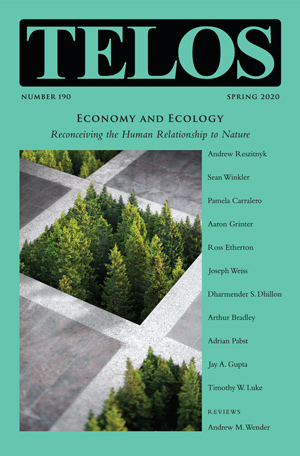By Telos Press · Tuesday, January 12, 2021 In today’s episode of the Telos Press Podcast, Camelia Raghinaru talks with Justin Neville Kaushall about his article “Natural Spontaneity, or Adorno’s Aesthetic Category of the Shudder,” from Telos 192 (Fall 2020). An excerpt of the article appears here. If your university has an online subscription to Telos, you can read the full article at the Telos Online website. For non-subscribers, learn how your university can begin a subscription to Telos at our library recommendation page. Purchase a print copy of Telos 192 in our online store.
Listen to the podcast here.
Continue reading →
By Telos Press · Monday, December 7, 2020 The new issue of the journal New Political Science features a review symposium on Timothy W. Luke's Anthropocene Alerts: Critical Theory of the Contemporary as Ecocritique, published by Telos Press Publishing. For one week only, save 30% on your purchase of Anthropocene Alerts by using the coupon code ALERTS30 during checkout in our online store.
Continue reading →
By Telos Press · Tuesday, December 1, 2020 Now available! Screens of Power: Ideology, Domination, and Resistance in Informational Society, by Timothy W. Luke. Purchase your copy in our online store and save 20% by using the coupon code BOOKS20 during checkout. Also available in Kindle ebook format at Amazon.com.
Screens of Power
Ideology, Domination, and Resistance in Informational Society
 by Timothy W. Luke by Timothy W. Luke
With a Foreword by Ronald J. Deibert
This new edition of Screens of Power: Ideology, Domination, and Resistance in Informational Society, first published in 1989, reintroduces the innovative critique of informational culture, politics, and society outlined by Timothy W. Luke in Telos and other publications during the late 1970s and early 1980s. Much has changed, but far more has stayed the same, making this new edition useful for many readers, as digital images ground personal identity, informatics is geopolitics, grand history endlessly reruns as televisually formatted ritual, electronic electioneering never ends, tele-traditional cultures spin up the spirit of tele-ethnicity in new social movements, and digital divides continue crashing against cybernetic exchange.
Continue reading →
By Telos Press · Monday, November 16, 2020 Now available for pre-order: Screens of Power: Ideology, Domination, and Resistance in Informational Society, by Timothy W. Luke. Pre-order today in our online store and save 30% off the list price. Release date: December 1, 2020. Also save 30% on Luke’s Anthropocene Alerts: Critical Theory of the Contemporary as Ecocritique and on A Journal of No Illusions: Telos, Paul Piccone, and the Americanization of Critical Theory, edited by Tim Luke and Ben Agger.
Screens of Power
Ideology, Domination, and Resistance in Informational Society
 by Timothy W. Luke by Timothy W. Luke
With a Foreword by Ronald J. Deibert
Release date: December 1, 2020
This new edition of Screens of Power: Ideology, Domination, and Resistance in Informational Society, first published in 1989, reintroduces the innovative critique of informational culture, politics, and society outlined by Timothy W. Luke in Telos and other publications during the late 1970s and early 1980s. Much has changed, but far more has stayed the same, making this new edition useful for many readers, as digital images ground personal identity, informatics is geopolitics, grand history endlessly reruns as televisually formatted ritual, electronic electioneering never ends, tele-traditional cultures spin up the spirit of tele-ethnicity in new social movements, and digital divides continue crashing against cybernetic exchange.
On now countless screens of power, which are embedded in billions of smartphones, taxi seats, elevator panels, automobile dashboards, refrigerator doors, airport walls, work cubicles, skyscraper displays, exercise machines, and home video centers, a mix of disinformative mystifications exploits with vivid images of violence the unprecedented inequalities and inequities expressed in America’s bitter racial, gender, ethnic, and class conflicts. Their impact is sparking widespread popular resistance because many citizens feel oligarchy and demagoguery in both political parties are eclipsing democracy and opportunity.
Continue reading →
By Andrew Reszitnyk · Thursday, May 21, 2020 Andrew Reszitnyk’s “The Descent into Disanthropy: Critical Theory and the Anthropocene” appears in Telos 190 (Spring 2020): Economy and Ecology: Reconceiving the Human Relationship to Nature. Read the full article at the Telos Online website, or purchase a print copy of the issue in our online store. Individual subscriptions to Telos are available in both print and online formats. Ernst Jünger’s Sturm, published in English translation by Telos Press, is also available in our store.
 This essay suggests that the widespread engagement in humanities scholarship with the concept of the Anthropocene—the proposed geologic epoch in which humans figure as a terrestrial force and the planet appears as a human artifact—has given rise to a strain of critical theory that renounces the imperative to engage in politics. I argue that the notion of the Anthropocene has inspired a turn toward what Greg Garrard calls “disanthropy,” the tendency to fantasize about a world in which living human bodies are absent and to render human life into an abstract concept. Through an analysis of the work of Dipesh Chakrabarty and Timothy Morton, I contend that, insofar as they have become disanthropic, many contemporary critical theorists have relinquished the capacity to engage critically with the influential and pernicious politico-economic ideology of neoliberalism. Although many scholars argue that we should view the Anthropocene as a vital provocation that opens up new corridors for environmentalist scholarship, I propose that we remain skeptical about the value of positing the Anthropocene at the center of critical inquiry. I suggest that the growing reputation of the idea of the Anthropocene has caused a significant segment of humanistic scholarship to enter into a political and philosophical détente with neoliberalism, with the effect that critical theory is becoming less and less capable of responding to the questions posed by the world outside the university. This essay suggests that the widespread engagement in humanities scholarship with the concept of the Anthropocene—the proposed geologic epoch in which humans figure as a terrestrial force and the planet appears as a human artifact—has given rise to a strain of critical theory that renounces the imperative to engage in politics. I argue that the notion of the Anthropocene has inspired a turn toward what Greg Garrard calls “disanthropy,” the tendency to fantasize about a world in which living human bodies are absent and to render human life into an abstract concept. Through an analysis of the work of Dipesh Chakrabarty and Timothy Morton, I contend that, insofar as they have become disanthropic, many contemporary critical theorists have relinquished the capacity to engage critically with the influential and pernicious politico-economic ideology of neoliberalism. Although many scholars argue that we should view the Anthropocene as a vital provocation that opens up new corridors for environmentalist scholarship, I propose that we remain skeptical about the value of positing the Anthropocene at the center of critical inquiry. I suggest that the growing reputation of the idea of the Anthropocene has caused a significant segment of humanistic scholarship to enter into a political and philosophical détente with neoliberalism, with the effect that critical theory is becoming less and less capable of responding to the questions posed by the world outside the university.
Continue reading →
By Joseph Weiss · Wednesday, April 22, 2020 Joseph Weiss’s “The Old in New Critical Theory: Locating the Gambler and the Prostitute in the Image of Neoliberalism” appears in Telos 190 (Spring 2020): Economy and Ecology: Reconceiving the Human Relationship to Nature. Read the full article at the Telos Online website, or purchase a print copy of the issue in our online store. Individual subscriptions to Telos are available in both print and online formats.
 This essay is part of a larger project that aims to trace the return of the old in “new” critical theory. It attempts to demonstrate how, after the failure of the second generation of the Frankfurt School to situate the ongoing antagonisms of neoliberal social relations, several of the concepts of the first generation weigh on the comportment of “new” critical theory. More specifically, by examining the figures of the gambler and the prostitute in relationship to Walter Benjamin and Theodor W. Adorno’s conception of the dialectical image, we observe just how much the critique of commodity fetishism, the use of rhetoric in historico-philosophical presentation, as well as the analysis of political economy and class relations, continue to assert themselves as pressing needs for social theory. In beginning to perform this “new” critical theory that heeds the dialectical tension between the past and present, an image of the unfulfilled desires at work in both the idea of communism and neoliberalism ultimately comes to the fore. Instead of undialectically discarding these figures as morally bankrupt or expressions of mere illusion and falsehood, we are called to capture the truth of their appearance, i.e., the ambivalent desire that promises submission to domination at the same time that it highlights an indispensable moment in the real possibility of emancipation. This essay is part of a larger project that aims to trace the return of the old in “new” critical theory. It attempts to demonstrate how, after the failure of the second generation of the Frankfurt School to situate the ongoing antagonisms of neoliberal social relations, several of the concepts of the first generation weigh on the comportment of “new” critical theory. More specifically, by examining the figures of the gambler and the prostitute in relationship to Walter Benjamin and Theodor W. Adorno’s conception of the dialectical image, we observe just how much the critique of commodity fetishism, the use of rhetoric in historico-philosophical presentation, as well as the analysis of political economy and class relations, continue to assert themselves as pressing needs for social theory. In beginning to perform this “new” critical theory that heeds the dialectical tension between the past and present, an image of the unfulfilled desires at work in both the idea of communism and neoliberalism ultimately comes to the fore. Instead of undialectically discarding these figures as morally bankrupt or expressions of mere illusion and falsehood, we are called to capture the truth of their appearance, i.e., the ambivalent desire that promises submission to domination at the same time that it highlights an indispensable moment in the real possibility of emancipation.
Continue reading →
|
|




